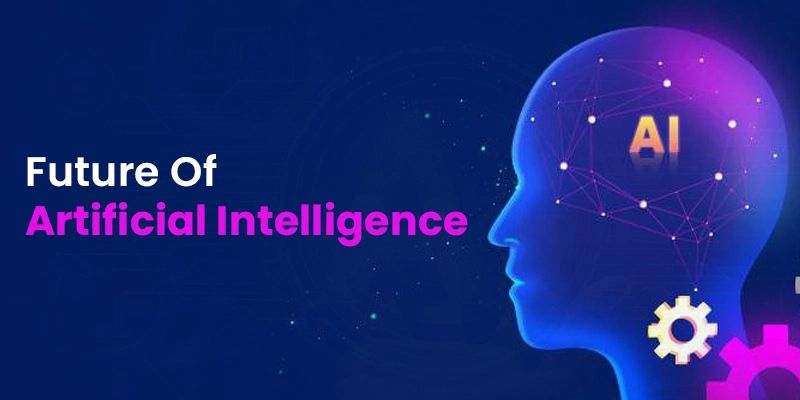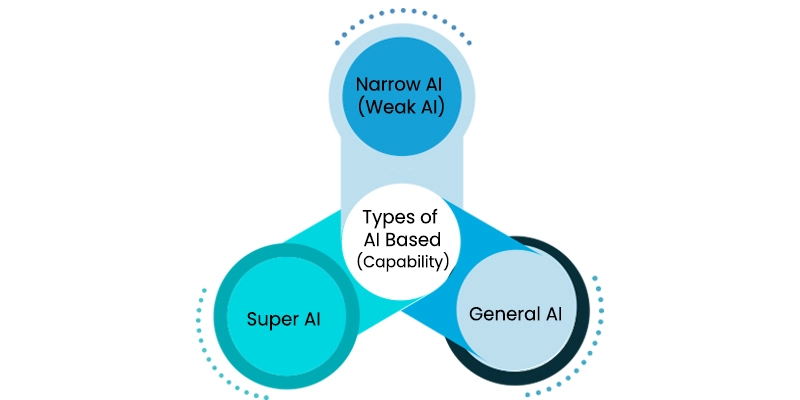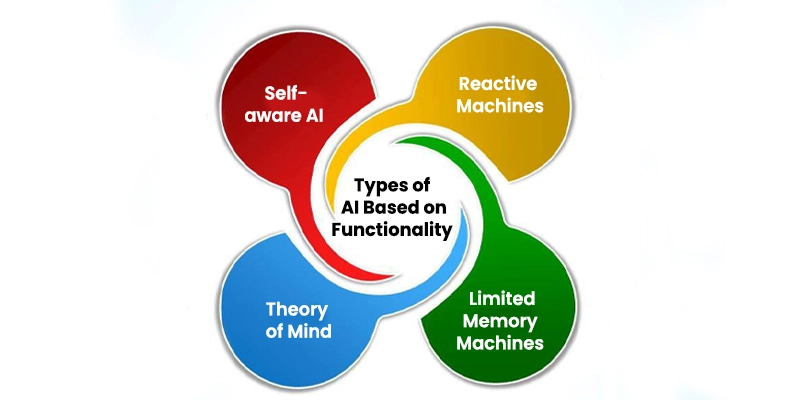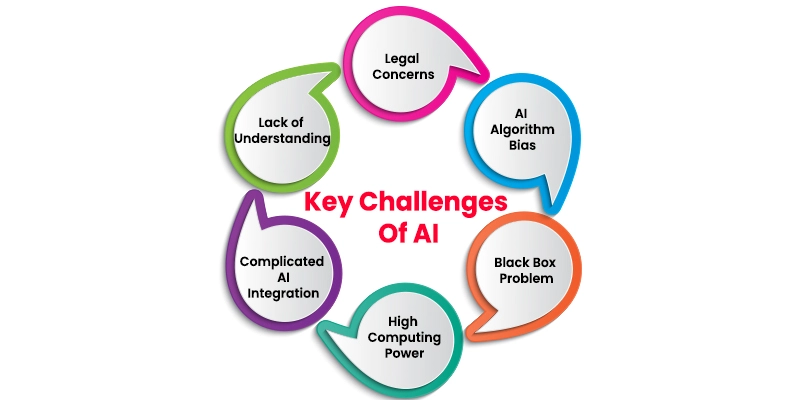
Machine or computer intelligence is known as artificial intelligence (AI), enabling them to replicate or simulate human capabilities. This field encompasses various technologies that empower machines to perceive, comprehend, plan, act, and learn, achieving intelligence levels comparable to humans. The core functionalities of AI systems involve environmental perception, object recognition, decision-making support, problem-solving, learning from experiences, and pattern imitation. These capabilities synergize to perform diverse tasks, such as autonomous driving and facial recognition for device authentication. For those intrigued by the vast potential of AI and eager to delve into its intricacies, considering an Artificial Intelligence Course in Chennai could be a rewarding step towards gaining expertise in this transformative technology.
The AI landscape encompasses a spectrum of technologies,encompassing computer vision, natural language processing, machine learning, and more. These cutting-edge technologies empower computer systems to comprehend human language, derive insights from examples, and make predictions.
While each AI technology evolves independently, their integration with other technologies, data, analytics, and automation holds transformative potential for businesses. The collaborative application of AI can revolutionize operations, contributing to goals like optimizing supply chains and elevating customer service standards. The multifaceted nature of AI positions it as a powerful force shaping the future of technological advancements and their impact on various industries.
How Does AI Work?
The functioning of an AI system initiates with the reception of data input, which can be in the form of speech, text, images, etc. The system undergoes a data processing phase where it applies a diverse set of rules and algorithms to interpret, predict, and act upon the received data. Following processing, the system produces an outcome, signaling either success or failure in handling the input data. This result undergoes scrutiny through analysis, discovery, and feedback mechanisms. Subsequently, the system utilizes these assessments to make adjustments to input data, rules, algorithms, and target outcomes. This iterative loop persists until the desired and optimal result is achieved. This cyclical process showcases the adaptability and learning capabilities of AI systems, allowing them to refine their performance over time in response to various inputs and challenges.
Key Components Of AI
Intelligence, within the context of Artificial Intelligence (AI), encompasses a comprehensive ability to understand the environment. For a system to qualify as AI, its various components must operate synergistically. Let's delve into the fundamental components of AI.
1. Machine Learning (ML)
Machine Learning is an AI application that autonomously learns and refines its performance based on prior experiences, eliminating the need for explicit programming.
2. Deep Learning
Deep Learning, a subset of ML, processes data through artificial neural networks, enabling intricate learning and pattern recognition.
3. Neural Network
Neural Networks are computational systems loosely inspired by human brain neural connections. They play a pivotal role in facilitating deep learning processes.
4. Cognitive Computing
Cognitive Computing endeavors to emulate the human thought process in a computer model. It focuses on enhancing human-machine interactions by understanding language and interpreting images.
5. Natural Language Processing (NLP)
NLP is a tool enabling computers to comprehend, recognize, interpret, and generate human language and speech.
6. Computer Vision
Computer Vision utilizes deep learning and pattern identification to interpret image content, including graphs, tables, PDF pictures, and videos.
The seamless integration of these components empowers AI systems to exhibit intelligent behavior, facilitating advancements in diverse applications.
Types Of AI
Two major categories can be used to categorise artificial intelligence: capability-based AI and functionality-based AI. Let's examine each kind in more detail.
Types of AI Based on Capability

Narrow AI (Weak AI)
Narrow AI, or Weak AI, represents systems designed to perform specific tasks proficiently within defined parameters. Unlike broader AI concepts, Narrow AI is goal-oriented and excels in well-defined applications. Common instances include virtual assistants like Apple’s Siri and specialized systems like IBM’s Watson. These systems operate within pre-set constraints, providing efficient solutions for targeted functions. The focus is on achieving a high level of accuracy and performance within a narrow scope, making Narrow AI prevalent in various everyday applications.
General AI
General AI aims to replicate human-like cognitive abilities across a spectrum of tasks. Unlike Narrow AI, which excels in specific applications, General AI strives for adaptability and flexibility in handling diverse intellectual tasks. Currently, General AI remains an area of active research and development. The goal is to create machines capable of understanding, learning, and autonomously solving problems across various domains, mimicking the broad cognitive capabilities of humans.
Super AI
Super AI represents a hypothetical advancement in AI that surpasses human intelligence across all dimensions. The concept envisions machines with superior cognitive abilities, including advanced problem-solving, learning, reasoning, and communication skills. While Super AI is currently a speculative idea, it signifies the potential future evolution of artificial intelligence toward unprecedented levels of sophistication and autonomy. For those intrigued by the potential of AI and wishing to explore its future possibilities, enrolling in an Artificial Intelligence Course in Bangalore could provide a solid foundation for understanding and contributing to the ongoing developments in this transformative field.
Types of AI Based on Functionality

Reactive Machines
Reactive Machines are fundamental AI systems that respond to current situations based on predefined rules. These systems lack the ability to store past experiences or learn from them. Notable examples include IBM’s Deep Blue, which excelled in chess by evaluating immediate scenarios, and Google’s AlphaGo, an AI system for playing the board game Go. Reactive Machines are suitable for applications where real-time decision-making is crucial.
Limited Memory Machines
Limited Memory Machines possess the ability to store and use past experiences for a limited duration. These machines leverage historical data to enhance decision-making in tasks requiring context awareness. A practical example is found in self-driving cars, which store information about surrounding vehicles, traffic patterns, and speed limits to navigate effectively through dynamic environments.
Theory of Mind
Theory of Mind AI, currently in theoretical discussions and research, pertains to machines that can understand and interpret human emotions, beliefs, and intentions. This advanced form of AI would enable machines to engage in more sophisticated social interactions by recognizing and responding to human emotions, fostering improved human-machine collaboration.
Self-aware AI
Self-aware AI is a futuristic concept envisioning machines with self-consciousness, emotions, and beliefs. In this scenario, machines would possess a level of intelligence surpassing human cognition. While still in the realm of speculation, Self-aware AI represents the aspiration for highly advanced, autonomous systems capable of self-reflection and independent decision-making. Efforts in this direction remain exploratory, reflecting the evolving landscape of artificial intelligence.
Goals Of Artificial Intelligence
Artificial Intelligence is mostly accomplished by adapting human qualities and skills to machines through reverse engineering. Fundamentally, AI creates intelligent machines by interpreting human behaviour. To put it plainly,The feature of artificial intelligence’s primary goal is to develop technologies that let computer systems operate freely and intelligently.. The following explains the main objectives of AI.
Develop Problem-Solving Ability
AI research focuses on creating efficient problem-solving algorithms that simulate human reasoning. These algorithms can handle uncertainty and incomplete information, making them valuable for tasks like stock market prediction. The problem-solving ability and feature of artificial intelligence simplify complex tasks, offering reliable solutions to critical problems.
Incorporate Knowledge Representation
AI research emphasizes knowledge representation and engineering, conveying 'what is known' to machines through ontology. This representation enables computers to solve real-world problems, such as medical diagnosis or natural language interaction. Researchers expand AI knowledge bases using this information, optimizing models to achieve specific goals.
Facilitate Planning
Intelligent agents in AI enable future envisioning through planning. AI-driven planning involves determining procedural actions to achieve goals, optimizing performance through predictive analytics, data analysis, forecasting, and optimization models. Planning is crucial across robotics, autonomous systems, cognitive assistants, and cybersecurity.
Allow Continuous Learning
Learning is fundamental to AI, involving the improvement of knowledge through observations and experiences. AI systems, using supervised and unsupervised learning models, process input-output pairs to predict outcomes for new inputs. With minimal human intervention, AI systems, such as machine learning, undergo automated learning processes.
Encourage Social Intelligence:
Affective computing, or 'emotion AI,' enhances social intelligence by recognizing and simulating human experiences, feelings, and emotions. AI systems read facial expressions, body language, and voice tones, enabling human-level interaction. Research efforts aim to amplify machines' social intelligence capabilities.
Promote Creativity
AI fosters creativity and artificial thinking, aiding humans in accomplishing tasks more effectively. Through data analysis and consideration of alternatives, AI develops creative paths and opportunities. It serves as a platform to augment creativity, providing novel ideas and concepts, such as generating multiple interior design options for a 3D-rendered apartment layout.
Achieve General Intelligence
AI researchers aspire to create machines with general AI capabilities, combining all human cognitive skills for more proficient task performance. This enhances overall productivity, enabling machines to handle tasks with greater efficiency and freeing humans from risky endeavors, like bomb defusal.
Promote Synergy Between Humans and AI
A critical goal of AI is establishing synergy between humans and AI systems, allowing collaborative work to enhance capabilities. This approach encourages a partnership where humans and AI complement each other's strengths, creating a more effective and efficient work environment.For individuals seeking to stay ahead in this rapidly evolving domain, considering an Artificial Intelligence Course in Pondicherry could provide valuable insights and skills for navigating the future of AI.
Key Challenges Of AI

AI is at a point in time where it will almost certainly play a part in every area, including healthcare, manufacturing, robotics, autonomous systems, aviation, and many more. However, this does not mean that one can overlook the many difficulties that AI presents, even in light of its immense promise. Businesses can identify and strive towards eliminating the following crucial obstacles for AI in order to accelerate its growth:
AI Algorithm Bias
AI systems are susceptible to bias based on the data they are trained on, leading to racial, gender, communal, or ethnic biases. For instance, algorithms used in job interviews or loan eligibility decisions may inherit biases. It's crucial to train AI on unbiased data, and companies like Microsoft and Facebook are introducing anti-bias tools to identify and mitigate such biases.
Black Box Problem
AI algorithms often operate as black boxes, making their inner workings unclear. Understanding how an AI arrives at a prediction is challenging, making the systems somewhat unreliable. Solutions like 'local interpretable model-agnostic explanations' (LIME) models are being developed to provide additional information for each prediction, enhancing algorithm transparency.
Requirement of High Computing Power
AI, especially deep learning algorithms, demands significant computing power for efficient training. The need for additional cores and GPUs poses challenges, limiting implementation in fields like astronomy. Supercomputers are essential for complex algorithms, but their limited availability and high costs hinder widespread AI adoption. To address these challenges and contribute to the democratization of AI knowledge, individuals can explore educational avenues, such as an Artificial Intelligence Course in Coimbatore, which might provide them the ability to handle the challenges of implementing AI in a variety of fields—including ones with limited resources.
Complicated AI Integration
Integrating AI into existing corporate infrastructure is complex, requiring compatibility checks and AI interface implementation. Ensuring a seamless transition without negatively impacting current output poses challenges. Managing AI infrastructure complexity demands careful planning and execution.
Lack of Understanding of Implementation Strategies
While AI holds transformative potential, businesses face challenges in understanding effective implementation strategies. Identifying areas for AI application, setting realistic objectives, and establishing feedback loops for continuous improvement are crucial. Corporate managers need comprehensive knowledge of AI technologies and trends to target beneficial implementation areas.
Legal Concerns
Organizations must navigate legal concerns associated with AI, especially regarding data collection. AI systems collecting sensitive data may inadvertently violate state or federal laws. The U.S. government's draft rules for AI regulation highlight legal issues, including civil liability in scenarios like accidents involving driverless cars, raising questions of responsibility and criminal culpability.
Top 5 AI Trends in 2024
With the advancement of the digital era, The feature of artificial intelligence is becoming a potent force for change in a number of industries. New advancements in AI open up more commercial options as the field of AI continues to change. These are the top five advancements and trends in AI that FITA Academy expects to see in 2024.
Computer Vision Growth
In 2024, a surge in the adoption of computer vision technology is anticipated, with organizations making substantial investments, especially in projects leveraging machine learning (ML) algorithms to replicate human-like vision. Gartner's survey highlights the planned highest investments in computer vision, applied across diverse sectors like retail, healthcare, agriculture, manufacturing, and autonomous vehicles.
Autonomous Vehicles Surge
The autonomous vehicle industry is set to witness significant growth in 2024, driven by increased investments from car manufacturers. It is anticipated that the worldwide market for driverless cars would reach $146.4 billion in 2024, showcasing substantial growth. Companies such as Tesla, Uber, Google, and others are actively testing self-driving cars equipped with computer vision, and the trend is expected to intensify over the next 12 months.
Smarter Chatbots and Virtual Assistants
The pandemic has accelerated the development of smarter chatbots and virtual assistants in 2024. It is anticipated that the worldwide market for driverless cars would reach, these AI systems automate routine tasks and enhance digital workplace experiences. Leading conversational AI platforms like Amelia are achieving high accuracy in identifying customer intent and satisfaction rates comparable to human assistants. As organizations increasingly recognize the value of these advancements, professionals aiming to delve into the realm of AI can explore opportunities for learning and upskilling, such as pursuing an Artificial Intelligence Course in Trichy to stay abreast of the latest technological trends and contribute to the evolving landscape of intelligent automation.
Metaverse Solutions
As the tech industry delves into the metaverse concept, AI agents and virtual assistants are poised to play a pivotal role. Mark Zuckerberg's announcement of Facebook's rebranding as 'Meta' highlights the growing focus on creating immersive virtual environments. AI-powered virtual agents, including humanoid robots like Sophia, are expected to facilitate user interactions within the metaverse, marking a significant trend in AI research.
Enhanced Language Modeling
Improved language modelling continues to be a prominent trend in 2024. Language modelling technologies enable computers to understand language semantics, predict words, and convert text into code. OpenAI's Generative Pre-trained Transformer 3 (GPT-3) has been a major player in this space, with 175 billion parameters. The release of Codex and ongoing work on GPT-4 by OpenAI signal advancements in language modelling, anticipating a model 500 times larger than GPT-3.
Additional AI Trends: Beyond the highlighted trends, other noteworthy developments in AI for 2024 include hyper automation in businesses, the development and feature of artificial intelligence as a service (AIaaS), improved AIoT (artificial intelligence and the Internet of Things) sophistication, and heightened focus on AI in cybersecurity. These trends collectively indicate a dynamic landscape with continuous advancements and feature of Artificial Intelligence
